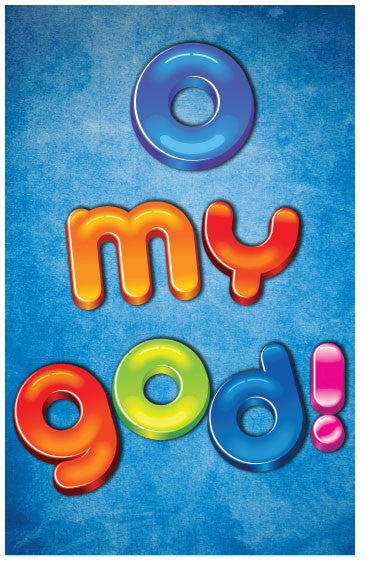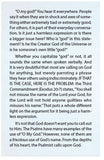O my god! (NIV)
Special-Order Folded Tract
 NOTE: This item is custom-printed to order (click for more details).
NOTE: This item is custom-printed to order (click for more details).
This tract is from our print-on-demand library, and is not kept in stock. Select the options below, and we will custom-print a batch just for you. Because this item is custom-printed, you can add your custom imprint to the back page at no extra cost.
- Estimated shipping date: Monday, February 23 (Click for more details)
- SKU:
- Discounts: Discount coupons do not apply to this item
- Format: Folded Tract
- Size: 3.5 inches x 5.5 inches
- Pages: 4
- Imprinting: Available with 5 lines of custom text
- Version: NIV
- Returns: Because this item is custom-printed to order, it cannot be returned.
Show all item details
The full text of this tract is shown below in the NIV version. (Do you want to print this tract in a different version than the one listed? Contact us and let us know what you're looking for—we may be able to create the alternate version for you at no charge.)
“O my god!” You hear it everywhere. People say it when they are in shock and awe of something either extremely bad or extremely good. For others, it is part of their everyday conversation. Is it just a harmless expression or is there a bigger issue here? Who is “god” in this statement? Is he the Creator God of the Universe or is he someone’s own little “god?”
Whether you capitalize “god” or not, it all sounds the same when spoken verbally. And it is very doubtful that most are calling on God for anything, but merely parroting a phrase they hear others using indiscriminately. IF THAT IS THE CASE, HERE IS THE PROBLEM: the Third Commandment (Exodus 20:7) states, “You shall not misuse the name of the Lord your God, for the Lord will not hold anyone guiltless who misuses his name.” That puts a whole different light on the argument for it being just a harmless expression.
It’s not that God doesn’t want you to call out to Him. The Psalms have many examples of the use of “O My God.” However, none of them are
a frivolous use of God’s name. From the depths of his heart, the Psalmist calls upon God.
Today, God wants you to call upon Him for salvation. Why is this necessary? Here’s the short story! God created the human race for fellowship with Himself. He wanted this friendship to be genuine and voluntary: therefore He created people with the freedom of choice. The first humans chose to disobey God even though He had given them everything they needed for a joyful life. This broke that relationship and henceforth all of us are in rebellion against God, “for all have sinned and fall short of the glory of God” (Romans 3:23).
Sin could not go unpunished because the “wages of sin is death” (Romans 6:23a). To restore that broken relationship with mankind, God sent His perfect Son, Jesus Christ, to this earth to die and to provide to a Holy God an acceptable sacrifice for our sins. God confirmed the acceptance and the validity of Christ’s sacrifice when He resurrected Him from the grave, the event we celebrate on Easter. By the way, the resurrection of Jesus Christ is one of the most well-documented events in history. *
That sacrifice of Jesus Christ was a gift to us. But a gift needs to be accepted in order to do you any good. That’s where we come in. We have a choice! That choice is to either: 1) accept Jesus’ death on the cross as payment for our sins or, 2) in doing nothing, we have already chosen to reject Him and an eternal home in heaven. “The gift of God is eternal life in Christ Jesus our Lord” (Romans 6:23b).
WHICH CHOICE HAVE YOU MADE?
*”The evidence for the Resurrection of Jesus Christ is so overwhelming that it compels acceptance by proof which leaves no room for doubt.” Sir Lionel Luckhoo, Famed Attorney and Diplomat











